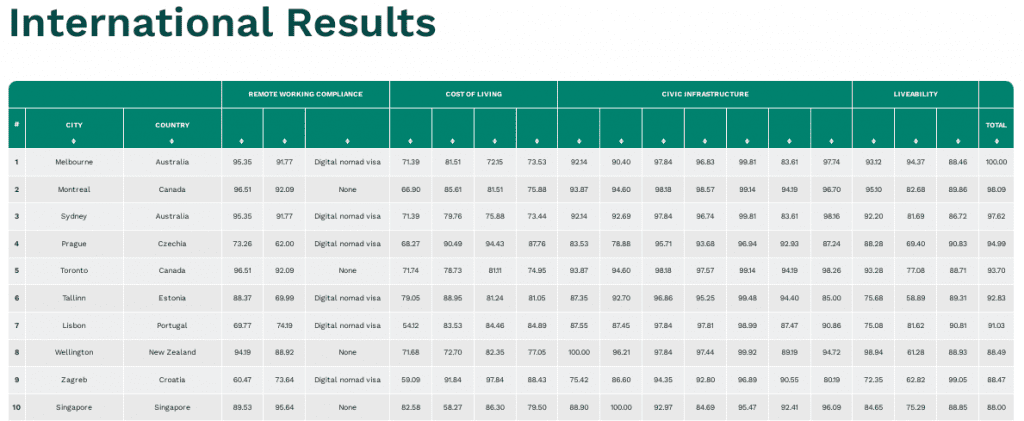A freshly unveiled study is capturing the attention of professionals across the globe as it reveals the best cities for remote workers.

Amid calls for employees to return to traditional office environments, there persists a surge in remote job opportunities, particularly from companies eager to engage Gen-Z and younger millennials.
The study zeroes in on ‘Workcations’—a trend gaining momentum as indicated by data from Workmotion, a leading platform ensuring compliance for remote workers.
The research identifies cities that excel not only in providing an ideal environment for work but also in nations that have strategically introduced nomad visas post-pandemic, turning them into sought-after workcation destinations.
Barcelona leads the pack, excelling in employment compliance, citizen contentment, and the availability of a digital nomad visa. Dubai and Prague are close contenders, while Copenhagen stands out for having the happiest citizens, followed by Bern and Wellington.

The study uses data to reveal which global cities are most accessible and attractive for remote workers by assessing factors related to remote working infrastructure, living costs, infrastructure and liveability, in addition to showing current location trends.
- Barcelona is the highest-ranking city in the index, scoring well for employment compliance factors, citizen happiness and its digital nomad visa. Dubai and Prague rank second and third.
- Dubai ranks best for Income tax, meaning remote workers keep more of their salaries, followed by Hong Kong and Singapore.
- The city with the happiest citizens is Copenhagen, followed by Bern and Wellington
Global employment specialists WorkMotion.com have released a study that analyses the ease of complying with local employment laws and ranks the attractiveness of 85 global cities for remote workers. As a company that helps companies hire employees based anywhere in the world, WorkMotion decided to rank the cities according to their remote working compliance regulations, cost of living, infrastructure and livability.

Additionally, they used proprietary data to illustrate current location trends by showing where remote workers are currently being hired. The resulting index reveals which cities are facilitating remote working best, and which are most attractive to relocate to, as well as current remote worker patterns.
Findings:
The table below reveals a sample of results for the top 10 cities for facilitating remote work out of the 80 cities in the index. All scores are out of 100, with 100 being the highest possible score and 50 being the lowest.
The Top 10 Cities for Remote Working Infrastructure:
The tables below reveal a sample of results for the 10 cities with the most straightforward employment compliance regulations and those with the lowest tax rates for remote workers:
How the study was conducted:
WorkMotion began the study by identifying a list of indicators that impact whether a city is a good place for relocation, covering employment compliance regulations, infrastructure, costs and liveability. They then assessed thousands of global cities against a range of factors related to remote working, before selecting the best-scoring 85 cities.
The study looks at, Remote Working Infrastructure, they assessed how straightforward it is for companies to compliantly hire remote workers based on local legislation, in addition to the legal requirements they must adhere to when employing a remote worker. They also identified whether the locations in the study offered a specific visa for remote workers.

The study also analysed the cost of living in each city by studying local tax rates, housing costs and availability, and how affordable the city is for food, energy and other living expenses.
Following this, they moved on to review each city’s civic infrastructure by assessing the ease of getting a visa. The cities’ level of safety and security was also evaluated, in addition to the quality of the health system and the access citizens have to healthcare.
To conclude the research, they assessed each city’s liveability by looking at the quality and variety of the cultural attractions on offer, the cost and quality of mobility and data on citizens’ happiness.
The resulting study provides an assessment of the current remote working landscape by ranking 80 global cities for their accessibility and attractiveness for this demographic.
Insights on Remote and Flexi working trends
“Although we had long anticipated the move to remote working and set up WorkMotion with this in mind, the pandemic accelerated the trend far faster than we could have imagined,” comments Carsten Lebtig, Co-Founder and Managing Director of WorkMotion.

He continued, “Nowadays, almost a year after the pandemic officially ended many people working in office jobs enjoy flexi working and split their time between their home and office, with little or no effect on productivity levels. Some companies, meanwhile, have been able to reduce the size of their offices, cutting expenses in doing so.”
He added, “Now that the dust is settling, many companies are beginning to look further afield when hiring employees, comfortable with the idea that the best person for the job might be located in a different country. The study gives insight into which countries have the most straightforward regulations when hiring remote workers.”
“When identifying possible destinations for Workations, remote workers must consider a range of factors ranging from the practical to the desirable,” comments Carsten Lebtig, Co-Founder and Managing Director of WorkMotion.
He went on to say, “Not many cities can offer them all, but it’s undeniable that cities legislating to attract remote workers become far more attractive than those that don’t. Making it easier for employees to work remotely in their city by offering these demographic-specific visas means the relocation process becomes far smoother. Only a few cities in the study offer a digital nomad visa, which is a specific document that allows remote workers to continue their employment in the country of relocation, demonstrating that the majority of cities still lag in this area. “
“The growth of remote working has opened up new avenues for employees around the world,” comments Carsten Lebtig, Co-Founder and Managing Director of WorkMotion. “People are increasingly less restricted by their location and the size of its job pool, and can regard foreign locations as possible work destinations regardless of whether or not they speak the local language.”
He added, “Now that the initial shock of the pandemic has subsided, we wanted to capture a snapshot of the current remote working landscape as the first step in tracking how it changes over the coming years. Many remote workers are drawn to cities by the promise of a different lifestyle or climate. The leaders of Barcelona, Dubai and Prague can be proud to say they’ve done things right and their cities are the best destinations for a Workation as well as to live, play and work from.
Read more: Latest



